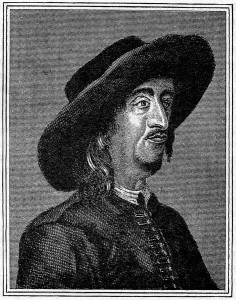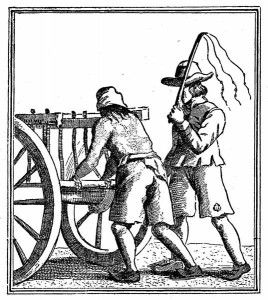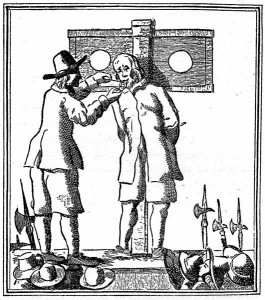Taken from Bristol Past and Present by J. F. Nicholls and John Taylor, published in 1882
In our ECCLESIASTICAL HISTORY, at 24 and 285, we have already given some description of the rise and sufferings of that section of the church of Christ known originally as the Quakers, but now more frequently called the Friends, who were the first sufferers in Bristol for conscience sake since the days of the Marian persecution. Their first appearance in Bristol was probably in 1652; certainly they were here in 1653. At serious variance with their fellow-Separatists, and bitterly persecuted by the Presbyterian hierarchy, they rapidly increased in number in Bristol. Conceiving themselves the subjects of inward monitions from the Divine Spirit, resolutely opposed to compulsory payments for religious services, rejecting some of the courtesies of society, remarkable for plainness in dress and manner of speech, they pertinacious thrust themselves into the churches and offensively gave utterance to their peculiar views before the assembled congregations. They thus brought upon themselves punishments which, if not wholly unmerited, were, it must be allowed, carried to an excess that was thoroughly disgraceful to a civilised Christian community, punishments which in several instances resulted in death. In 1655, James Naylor, who had been one of their preachers, suffering under aberration of mind, came to Bristol from Glastonbury, attended by a concourse of persons more mad apparently than himself. They “spread their garments before him, handkerchiefs, aprons, scarfs and the like, and even gloves, singing ‘Holy, holy, holy,’ &c. October 24th, 1656, they came through Bedminster; Naylor rode on horse- back, and there were six more in his company, one of whom, a young man, bareheaded, led his horse by the bridle, and another uncovered before him, through the dirty way in which carts and horses and none else usually go, and with them two men on horseback, with each of them a woman behind him, and one woman walking on the better way or path. In this posture did they march, and in such a case that one George Witherley, noting their condition, asked them to come into the better road, adding that God expected no such extremity; but they continued on their way, not answering in any other notes but what were musicall, singing “Holy, holy, holy, Lord God of Sabaoth,” &c. Thus continued they till by their wandering they came to the almeshouse within the suburbs of Bristol, where one of the women alighted, and she, with the other of her own sex, lovingly marched on either side of Naylor’s horse. This Witherley saith he supposes they could not be lesse deep in the muddy way than to the knees (and at this very time it happened to rain so violently that the water ran in streams from their cloaths); and he saith they sang, but sometimes with such a buzzing mel-ODIOUS noyse, that he could not understand what it was. This the said Witherley gave in upon oath. Thus did they reach Ratcliff gate, with Timothy Wedlock, of Devon, bareheaded, and Martha Symonds with the bridle on one side, and Hannah Stranger on the other side of the horse. This Martha Simonds is the wife of Thomas Simonds, of London, bookbinder (and sister to Giles Calvert, the bookseller, living at the black-spread-eagle at the west end of Paul’s, publisher of most of the fanatic books of that day), and Hannah Stranger is the wife of John Stranger (alias Stangar), of London, combmaker, who sung “Holy, holy, holy, Lord God of Israel.” Thus did he ride to the High Crosse in Bristol, and after that to the White Hart “in Broad street.”*
* Seyer, II., 485-6.

Being apprehended, Naylor was sent to London by the mayor, and was tried for blasphemy by the Barebone’s Parliament. The trial lasted thirteen days. “December 16th, it was proposed that the punishment of James Naylor should be death; and the question being put, ‘the noes went forth ninety-six, the yeas eighty-two, so it passed in the negative.’ On the next day, Wednesday, 17th, the House agreed to the following sentence:- ‘Resolved, that James Naylor be set on the pillory with his head in the pillory in the Palace yard, Westminster, during the space of two hours on Thursday next, and shall be whipt by the hangman through the streets from Westminster to the Old Exchange, London; and there likewise be set on the pillory with his head in the pillory for the space of two hours, between the hours of eleven and one on Saturday next, in each place wearing a paper containing an inscription of his crimes; and that at the Old Exchange his tongue be bored through with a hot iron, and that he be there also stigmatised in the forehead with the letter B; and that he be afterwards sent to Bristol, and be conveyed into and through the said city on horseback, bareridged, with his face backward, and there also publickly whipt the next market-day after he comes thither; and that from thence he be committed to prison in Bridewell, London, and there restrained from the society of all people, and there to labour hard, till he shall be released by Parliament; and during that time be debarred the use of pen, ink and paper, and shall have no relief but what he earns by his daily labours.’ This inhuman sentence was fully executed on the unhappy maniac. Thursday, December 18th, he stood in the pillory in Palace yard, and was from thence whipped to the Old Exchange, receiving 310 lashes, one on crossing each gutter.”*
* Seyer, II., 491-2.
“Saturday, December 20th, James Naylor was to have suffered the remaining part of his sentence; but on the morning of that same day a petition was presented to the House, signed by Joshua Sprigge, formerly an eminent independent preacher, author of a book quoted above, T. Z. and Jer. White (Cromwell’s chaplain), C. H. representing the wretched condition of the prisoner and the danger to his life if he should receive the remainder of his punishment; and praying in the name of many honourable persons, both citizens and others, wholly unconnected with him, for a week’s respite, which was granted. Meanwhile many wellaffected and respectable persons, of whom Colonel Scrope, sometime governor of the castle and fort of Bristol, was the first name, shocked at the inhumanity of the sentence, petitioned Parliament for a remission of the remaining part of the sentence; many of the members were against admitting the petition, but being put to the vote it was admitted. The petition was presented Tuesday, December 23rd, at the bar of the House, by Mr. Joshua Sprigge, above-mentioned, accompanied by about one hundred eminent persons in behalf of the whole; Mr. Sprigge made a short speech on presenting, but it was unsuccessful. The petitioners then applied to his highness the Protector, still without effect. On Wednesday, December 24th, five Presbyterian or Independent ministers, Caryl, Manton, Nie, Griffith and Rennolds, went to James Naylor in Newgate, and it was said that they did so by order of the Parliament; but Naylor persisting in his ordinary discourse and usual answers, they left him in wrath.
On Saturday, December 27th, he suffered the remaining part of his punishment. ‘About eleven o’clock he was carried in a coach from Newgate to the Black Boy, near the Royal Exchange, in which house he continued till the clock had struck twelve at noon, when by divers on foot with halberts he was guarded to the pillory, where when he came they presently put his head into the same, and having pinned it down came up Martha Symonds, and with her two others, who were said to be Hannah Stranger and Dorcas Erbury; the first seated herself just behind on the right side, the two latter before him, and Robert Rich likewise accompanied him with comfortable words, kissings and stroaking on his face. He having stood till two, the executioner took him out, and having bound his arms with cords to the pillory, and having put a cap over his eyes, he bad him put forth his tongue, which he freely did, and the executioner with a red-hot iron, about the bigness of a quill, bored the same, and by order from the sheriff held it in a small space, to the end the beholders might see and bear witness that the sentence was thoroughly executed; then, having took it out, and pulling the cap off that covered his face, he put a handkerchief over his eyes, and putting his left hand to the back part of his head, and taking the red-hot iron letter in his other hand, put it to his forehead till it smoaked, all which time James never so much as winced, but bore it with astonishing and heart-melting patience. Being unbound, he took the executioner in his arms, embracing and hugging him; after which Robert Rich, through his ardent love, licked the wound on his forehead. And James was conveyed to the Black Boy, and from thence to Newgate.’ This Robert Rich had been a merchant in London, an enthusiastic follower of Naylor, a perfect maniac, but religious and harmless. After James Naylor had been on the pillory some time, ‘he took a paper out of his pocket and placed it over his head, whereon was written, ITIS WRITTEN LUKE 23, 38, THIS IS THE KING OF THE JEWS. But presently an officer stept up and pulled it down, and turned Robert Rich and the two women off the pillory; but after a while they lifted up Robert Rich again on the pillory, where he staid till James Naylor had undergone his sufferings for that time, and held him by the hand whilst he was burning, and afterward licked and sucked the fire out of his tongue and led him by the hand from off the pillory. This was also very remarkable, that notwithstanding there might be many thousands of people, yet they were very quiet, few heard to revile him or seen to throw any one thing at him. And when he was a burning, all the people, both before him and behind him and on both sides of him, with one consent stood bareheaded.
Afterwards he was sent by the sheriffs of London to Bristol, and the sheriffs of Bristol before that had a warrant under the speaker’s hand to see the sentence executed as far as they were concerned therein. January 16th, 1656-7, he arrived at Lawford’s gate, where he slept. January 17th, this day James Naylor took horse at Lawford’s gate and rode on the horse bareridged, with his face to the tail, through the city without Redcliff gate, and there alighted, and was brought to the middle of Thomas street, and there stripped, and then tyed to the horse to be whipt from thence back again to the middle of Broad street. Before his whipping the fol lowing order was sent to the keeper of Newgate:- ”Mr. Roch, cause Naylor to ride in at Lawford’s gate, from thence along Wine street to the Tolzey, thence down High street, over the bridge, and so out at Redcliff gate; there let him alight, and bring him into Thomas street, and cause him to be stripped and there made fast to the cart-horse, and in the market fist whipped; from thence to the foot of the bridge, there whipped; thence to the end of the bridge, there whipped; thence to the middle of High street, there whipped; thence to the Tolzey, there whipt; thence to the middle of Broad street, there whipped; and then tane (taken) into the Taylor’s hall; there release him from the cart-horse, and let him put on his clothes and carry him thence to Newgate, by Tower lane, the back way.” And whereas of custom the bellman goes before and makes proclamation of the offence of the offender, yet here the keeper commanded the bellman to the contrary (as was said), and suffered one Jones (a coppersmith and ugly Quaker) to hold back the beadle’s arm when striking; and in all the way the bell rang but six times, a trait of mercy in the midst of such brutality which ought to be recorded to the credit of the magistracy of Bristol. All the while he passed along, his dear and worthy friend, Robert Rich, the maniac above mentioned, rode bareheaded before him, having a meer-maid’s head, such was the length of his hair, singing “Holy, holy,” &c. After this the sheriffs of Bristol sent him up to the governors of Bridewell, London, who had before received order from the speaker as to that part of the sentence wherein they were concerned, where he continued till the wise providence of God released him. After his discharge from Bridewell he returned to this city, and in a meeting with some of his friends he made a public recantation of his errors in so affecting a manner that they were convinced of the sincerity of his repentance. He lived some time afterward in this city in a serious and becoming manner, and died on a journey from hence to Wakefield, in Yorkshire, where he was born in 1616. *
*Seyer, II., 493-6

